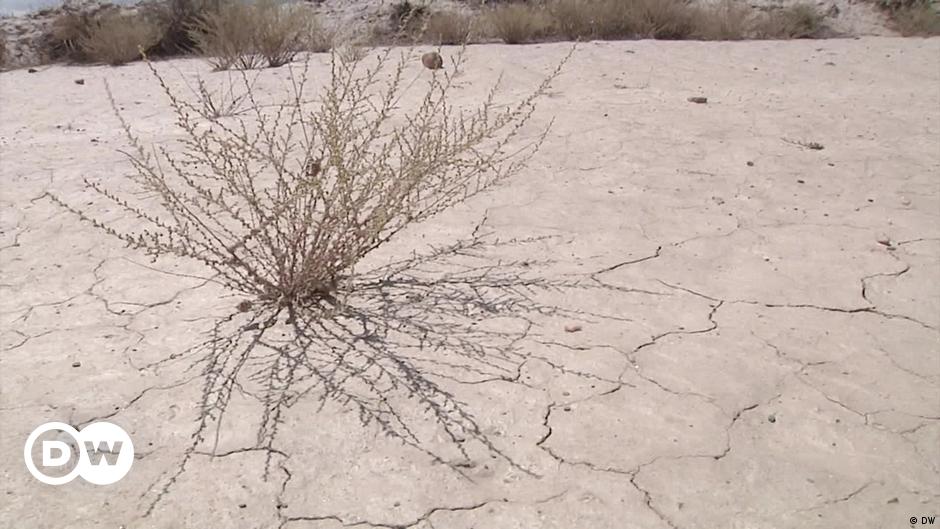
The La Vinuela reservoir is the most important water storage facility in the southern Spanish province of Malaga. But following months without rain and an unparalleled heat wave, the reservoir, which is normally 6 kilometers (3.7 miles) long and 100 meters deep, has only 12% of its former water volume.
The reservoir used to be a tourist attraction but has now been reduced to a mere puddle surrounded by tons of mud.
Local farmers describe the situation as dramatic. They are now allowed to use only a small fraction of the water they once redirected to their fields. Europe’s largest avocado-growing area is located in the vicinity of the reservoir. The avocados grown here are also shipped abroad, including to German supermarkets. Without enough water, the harvest is expected to be poor.
Trees fall victim
More and more avocado trees are drying out; the soil is covered with withered fruits. As a last resort, farmers are being forced to uproot some trees so as not to lose the whole harvest. “It’s better to get rid of some trees so that those remaining get enough water,” says the local farmers’ association.
Domingo Medina removed 1,500 out of his 6,000 avocado trees. The head of the association of tropical fruit farmers says many farmers were about to quit as they could no longer live off their plantations. He warns that no water could be available at all if it doesn’t rain soon and the reservoir fills up again.
When water gets scarce, priority is given to the households located in the reservoir’s catchment area.
Spain is a big exporter of avocados, with Germany counting among its largest customers
Olive farmers affected, too
Avocado farmers are not the only ones suffering in Spain these days. The whole agriculture sector is affected by the worst drought in years, says the Asaja farmers’ association. Millions of olives are drying up across Andalusia; oranges, lemons and tangerines are meeting the same fate in the Valencia region. In northern Spain, wine growers are fighting an uphill battle to rescue some of their fruits by resorting to harvesting prematurely.
There’s no quick fix in sight. Meteorologists from the AEMET weather service predict there will be no rain before October. And the situation is unlikely to change in the years ahead.
“Forecasts suggest that periods of drought in Spain will even get longer and will occur more often,” said AEMET spokesperson Ruben del Campo, adding that this was clearly a result of climate change caused by greenhouse emissions.
Farmers will have to reckon with drastic harvest losses. Spanish olive oil producers for instance expect their harvests to be cut by half this year alone. This will drive up prices in Europe even more, warns Aurelio Juzgado who heads a producers’ association.
Spain is the world’s largest producer of olive oil by a wide margin.
Agriculture wasting water?
The sunflower fields along the Spanish highways are also in a bad state. Experts say yields will drop by up to one-third in 2022 year on year. This will further drive up prices on the EU market where sunflower oil supply has been hurt by Russia’s invasion of Ukraine. The two are the world’s largest exporters of the oil, with Spain being one of the largest suppliers within the European Union.
In response to the latest developments, farmers in Germany have more than doubled sunflower areas since the start of the war in Ukraine.
Spain’s Agriculture Ministry expects grain harvests to tank this year and beyond. According to the Efe news agency, barley, rye and wheat harvests could fall by a quarter. Agriculture Minister Luis Planas promised millions of euros in aid to farmers to enable them to adopt more efficient, water-saving technologies. “We simply have to use water more efficiently,” Planas said.
Environmental campaigners have singled out agriculture as Spain’s biggest water squanderer. In many fields, outdated overhead sprinkling systems are still in use. Between 70% and 80% of Spain’s drinking water trickles away on arable land across the nation.
The environmental organization WWF calls this “a suicidal use of scarce water.”
Greenpeace spokesman Julio Barea adds that Spain’s water crisis is homemade. He accuses the government in Madrid and local environment agencies of insufficient foresight, claiming that water-saving plans were enacted far too late.
“You have to fight droughts when there’s still enough water around, not when it’s all gone,” Barea concluded.
Drought in Spain — farmers drill illegal wells
This article was first published in German.







